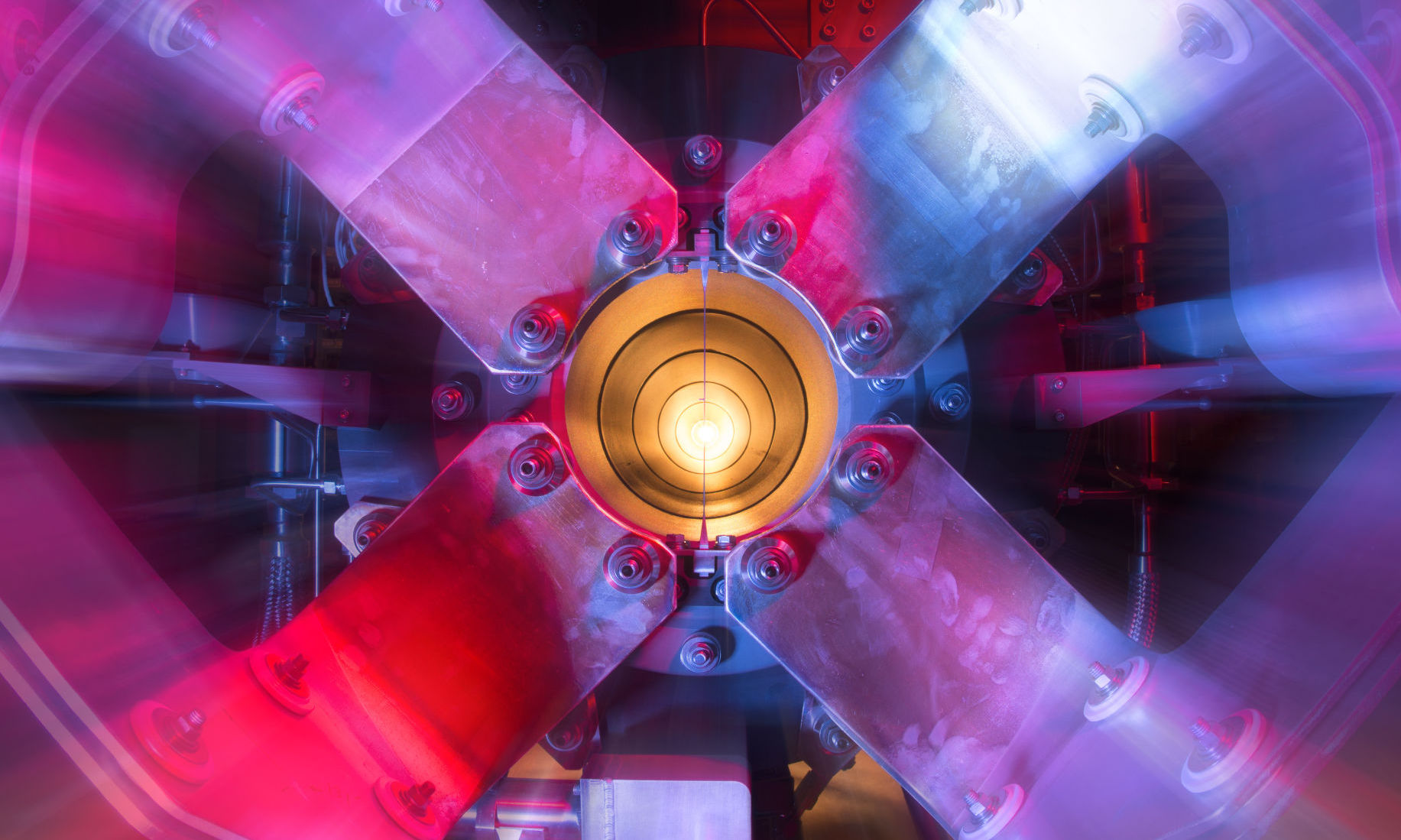|
|
|
|
 Rochester researchers used a particle accelerator at Fermilab—a portion of which is shown in a stylized image above—to create a beam of neutrinos to investigate the structure of protons. The work was part of the MINERvA experiment, an international collaboration to study neutrinos. (Credit: Reidar Hahn/Fermilab)
A new path to study protonsNeutrinos are one of the most abundant particles in our universe, but they are notoriously difficult to detect and study: they don’t have an electrical charge and have nearly no mass. They are often referred to as “ghost particles” because they rarely interact with atoms.
But because they are so abundant, they play a large role in helping scientists answer fundamental questions about the universe.
In groundbreaking research described in Nature—led by researchers from the University of Rochester—scientists from the international collaboration MINERvA have, for the first time, used a beam of neutrinos at the Fermi National Accelerator Laboratory, or Fermilab, to investigate the structure of protons.
First author Tejin Cai, now a postdoctoral research associate at York University, conducted the research as a PhD student of Kevin McFarland, the Dr. Steven Chu Professor in Physics at Rochester and key member of the University’s Neutrino Group.
In addition to providing more information about the common matter that comprises the universe, the research is important for predicting neutrino interactions for other experiments that are trying to measure the properties of neutrinos. Learn more.
New award for research honors Debra HaringDebra Haring, former assistant dean of grants and contracts in the School of Arts & Sciences, spent years working to support and promote the research of faculty in Arts, Sciences & Engineering.
To honor her legacy, Arts, Sciences & Engineering has created the Debra Haring Excellence in Research Award. The award will recognize a faculty member who has done research that is having a transformative impact on the field, or who has accumulated a body of research that has advanced the discipline in fundamental ways.
This award will bring to light some of the truly outstanding research our faculty perform every day and celebrate the importance of this work in changing lives and impacting society in myriad ways. Nominations for this award will be sought later this semester.
Anyone interested in contributing to the fund for this award can contact Lisa Hall. The award will ensure that Haring’s legacy, her strong work ethic, her intelligence, her humor, and her kindness live on for generations to come.Â
Vertino is new senior associate dean for basic research at Medical Center
Paula Vertino, an accomplished cancer research scientist and leader at the Wilmot Cancer Institute at the Medical Center, assumed the post of senior associate dean for basic research effective February 1.
Vertino was recruited to Wilmot in 2018 to transform its research endeavors by breaking down silos and promoting collaboration and team science. She enjoys identifying commonalities and bringing people together in a “grassroots” approach.
She sees her new role as an opportunity to interact more broadly across the Medical Center to enhance cross-programmatic communication, to work with institutional leadership to create an environment that fosters faculty and trainee success, and to further integrate the basic and clinical research enterprise.
“I feel strongly that, as a leader, one needs to be as invested in what others are doing as in one’s own research program, and have worked hard to use this approach as a way of bringing people together to facilitate research interactions,” noted Vertino, the Wilmot Distinguished Professor in Cancer Genomics. Learn more.
PhD dissertation defenseGriffin Schroeder, biochemistry, 10 a.m. February 8, 2023, Lower Adolf (1-7619) School of Medicine and Dentistry
Structural Basis of Translational Regulation by Bacterial Riboswitches
Advisor: Joseph E. Wedekind
New NSF I-Corps hub offers entrepreneurial trainingThe University is partnering with nine other universities in the northeast region to establish the NSF I-Corps Hub: Interior Northeast (IN I-Corps).
The partnership, stretching from New Hampshire to West Virginia, will offer entrepreneurial training opportunities to STEM researchers throughout the year.
If you have been working on a technology innovation and wish to explore its commercialization potential, I-Corps can provide you with entrepreneurial education, mentoring, and up to $50,000 in funding for customer discovery.
The first virtual short course at the University, in partnership with the Clinical and Translational Science Institute, will be held February 13–March 15.
Apply here by February 9. Interested, but can’t make that timing work? Learn about other upcoming courses.
Aging Institute seeks applications for three projectsThe University’s Aging Institute is soliciting grant applications to support up to three aging research projects.
One of these awards will be cosponsored by the Wilmot Cancer Institute and focus on cancer and aging. Two are sponsored by the Aging Institute with a focus on other basic, translational, or clinical aging research topics. The award is up to $50,000 for one year per award.
Letters of intent are due March 13. Invitations for full submissions will be solicited by April 17. Full submissions will be due on May 15. Instructions will be provided and posted on the Aging Institute’s website. The anticipated start date for successful proposals is July 1. Letters of intent or questions should be submitted via email.
Research funding available from Breast Cancer AllianceThe Breast Cancer Alliance, which aims to improve survival rates and quality of life for those impacted by breast cancer through better prevention, early detection, treatment, and cure, is offering two grant funding opportunities for clinical doctors and research scientists, including postdocs:
Apply by February 17.
|
|
|
|
|